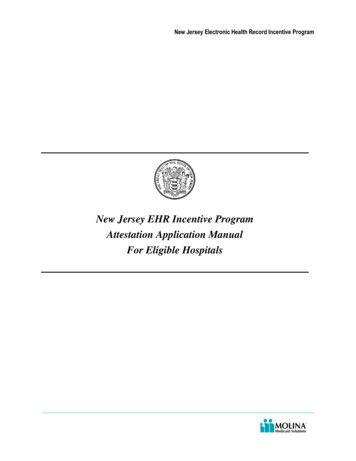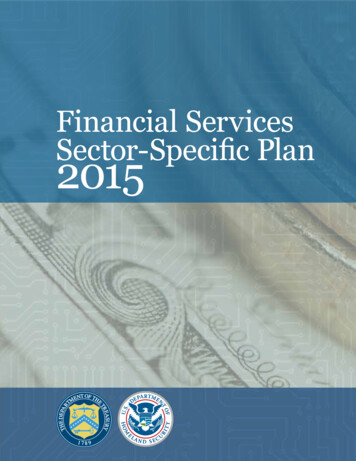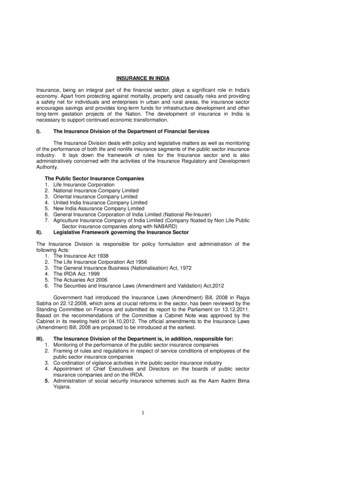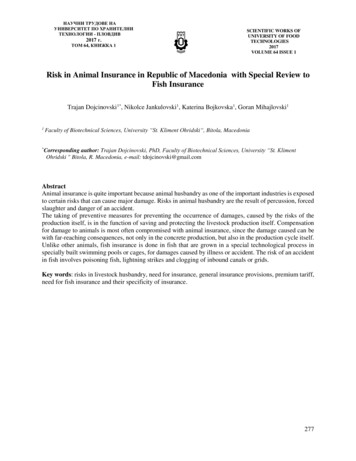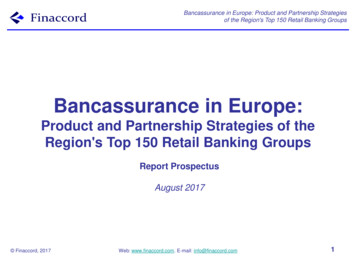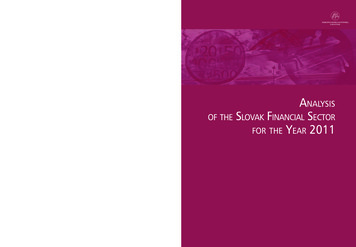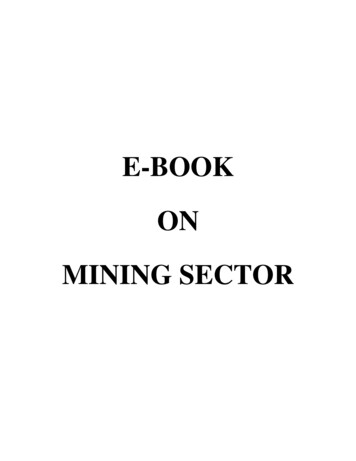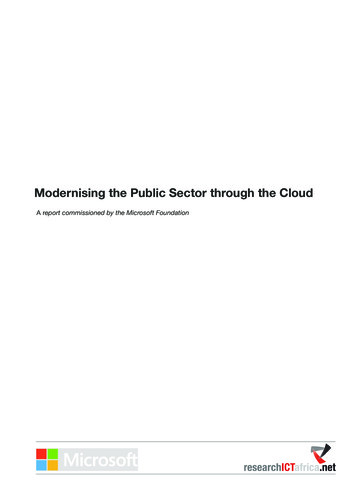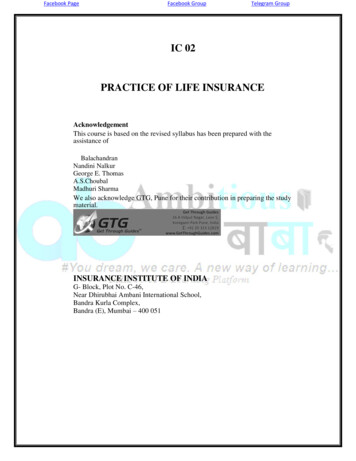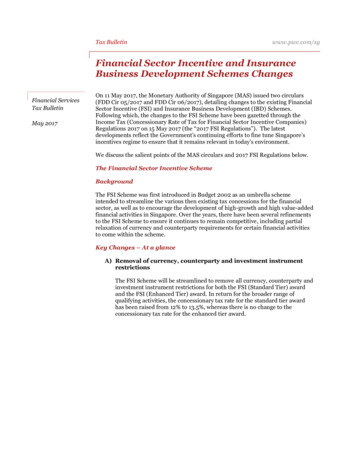
Transcription
Tax Bulletinwww.pwc.com/sgFinancial Sector Incentive and InsuranceBusiness Development Schemes ChangesFinancial ServicesTax BulletinMay 2017On 11 May 2017, the Monetary Authority of Singapore (MAS) issued two circulars(FDD Cir 05/2017 and FDD Cir 06/2017), detailing changes to the existing FinancialSector Incentive (FSI) and Insurance Business Development (IBD) Schemes.Following which, the changes to the FSI Scheme have been gazetted through theIncome Tax (Concessionary Rate of Tax for Financial Sector Incentive Companies)Regulations 2017 on 15 May 2017 (the “2017 FSI Regulations”). The latestdevelopments reflect the Government’s continuing efforts to fine tune Singapore’sincentives regime to ensure that it remains relevant in today’s environment.We discuss the salient points of the MAS circulars and 2017 FSI Regulations below.The Financial Sector Incentive SchemeBackgroundThe FSI Scheme was first introduced in Budget 2002 as an umbrella schemeintended to streamline the various then existing tax concessions for the financialsector, as well as to encourage the development of high-growth and high value-addedfinancial activities in Singapore. Over the years, there have been several refinementsto the FSI Scheme to ensure it continues to remain competitive, including partialrelaxation of currency and counterparty requirements for certain financial activitiesto come within the scheme.Key Changes – At a glanceA) Removal of currency, counterparty and investment instrumentrestrictionsThe FSI Scheme will be streamlined to remove all currency, counterparty andinvestment instrument restrictions for both the FSI (Standard Tier) awardand the FSI (Enhanced Tier) award. In return for the broader range ofqualifying activities, the concessionary tax rate for the standard tier awardhas been raised from 12% to 13.5%, whereas there is no change to theconcessionary tax rate for the enhanced tier award.
The revised set of the FSI qualifying activities and the applicable tax rates aresummarised in Table 1:1Table 1: Summary of the FSI SchemeSchemeTax RateQualifying ActivitiesFSI-Standard Tier(FSI-ST)13.5%(a) Where the financial sector incentive (standard tier)company is a licensed bank –(i)(ii)(iii)A.B.C.D.transacting in loans, other than by way of bonds ordebentures, with a body of persons, trust, company orfirm;providing services in respect of loans, other than byway of bonds or debentures;transacting with any bank or branch office in respectof any of the following:placement of fundsbankers’ acceptances on bills relating to tradetransactionsbills relating to trade transactionsnegotiable certificates of deposit(iv) transacting in or providing services relating to, tradetransactions, remittances, bank guarantees orperformance bonds;(b) Trading in any loans and their related collaterals (excludingimmovable property)2;(c)Trading or investing in or providing services (includingsecurities lending or repurchase arrangements and servicesas a broker, nominee or custodian) in respect of debtsecurities or stocks, shares, or other equity securities issuedby a company, collective investment scheme or businesstrust;(d) Providing services for the purpose of a listing on theSingapore Exchange to a company;(e)Foreign exchange transactions;(f)Trading in derivatives and providing services as anintermediary in connection with transactions relating toderivatives;(g)Transacting in or providing services in respect oftransactions in gold bullion, silver bullion or platinumbullion;1With effect from 1 April 2016, the Tax Incentive for Trustee Companies has been subsumed under the FSI Scheme(“FSI-TC”). While no changes have been announced to the FSI-TC Scheme in the above MAS Circulars, based onclarifications with the MAS, there will be proposed changes to the FSI-TC Scheme which will be announced shortly.2 Previously, the exclusion was with respect to Singapore immovable property only2
(h) Managing or providing investment advisory services(including through another fund manager) to, qualifyingfunds;(i)Providing other advisory services relating to financialmatters (other than investment advisory services in respectof fund management);(j)Providing trustee or custodian services in its capacity of atrustee of a trust;(k)Providing trustee services in respect of bond or loan stockissues, including services for monitoring loan covenantsand administering loan repayments;(l)Providing trustee services in respect of issue of units of, acollective investment scheme or a business trust;(m) Providing trust management or administration services toany trustee of a trust.Islamic FinanceLending and related activities, fund management and provisionof investment advisory services in respect of fund management.FSI-HeadquartersServices (FSI-HQ)10%(i)General management, risk management andadministration;(ii) Strategic business planning and strategic businessdevelopment;(iii) Operational processing services;(iv) Information technology support and technical services;(v)Training and personnel management;(vi) Corporate finance advisory services;(vii) Economic, financial, investment or market research andanalysis;(viii) Credit control and administration;(ix) Arranging credit facilities for the approved office;(x)Providing guarantees, performance bonds, standby lettersof credit and services relating to remittances where:A. in the case of a guarantee, performance bond orstandby letter of credit, the party in whose favourthe facility is issued is a financial institutionB. in the case of services relating to remittances, theperson to whom the remittances are made is afinancial institution3
(xi) Arranging interest rate or currency swaps with a financialinstitution;(xii) Managing the funds of the approved office.FSI-FundManagement(FSI-FM)Providing fund management or investment advisory services toqualifying funds.FSI-Capital Market(FSI-CM)5%(i)Trading or investing in, or providing services (includingservices as a broker, nominee or custodian, and the grant ofa loan of the securities under a securities lending orrepurchase arrangement) in respect of:A. debt securities; orB. stocks, shares, or other equity securities issued by acompany, a collective investment scheme or abusiness trust;(ii) Providing services for the purpose of a listing on theSingapore Exchange to a company.FSI-CFS(i) Arranging, underwriting or granting loans under anysyndicated facility which is a credit facility or a guaranteefacility, subject to conditions;(ii) Arranging, underwriting or granting a loan after it hasbecome a syndicated facility, subject to conditions;(iii) Trading in secondary loans under any syndicated facilitywhich is a credit facility or a guarantee facility by licensedor approved banks, subject to conditions.FSI-DM(i) Trading in, or providing services as an intermediary inconnection with transactions relating to any financialderivatives, commodity derivatives, emission derivatives orfreight derivatives;(ii) Incidental physical trading where volume of the incidentalphysical trading does not exceed 15% of the total volume ofincidental physical trading and trading in commodityderivatives;(iii) Providing project finance advisory services in connectionwith syndicated facilities relating to any prescribed asset orproject.Briefly, the notable changes to the scope of the qualifying activities of the FSI Schemeare as follows:a) Loan transactions by licensed or approved banks with individuals areexcluded (unless the individuals are carrying on business through a firm);b) Dealing in loan collaterals where the collaterals are immovable properties areexcluded;4
c) Fund management and investment advisory services under FSI-ST and FSIFM no longer need to be rendered in respect of designated investments orqualifying investors for the income to be FSI-qualifying; andd) FSI-CFS activities now cover onshore syndication. However, all CFS activitiesrelating to immovable properties need to be in respect of prescribedinfrastructure assets or projects.3B) Existing awards are grandfatheredThe above changes will apply to new and renewal awards approved on or after1 June 2017. Existing FSI award holders will continue to operate under theterms of their respective awards (with the existing scope and tax rate), untilsuch time the awards expire. They may then apply for the new awards (withthe new scope and tax rate) if they are able to meet the conditions.Notwithstanding the broadening of the scope of the FSI schemes, no changesto their qualifying criteria are expected.PwC’s observationsa) Staying relevantThe changes to the FSI Scheme are an indication of the authorities’ continuing effortsto ensure that the incentives remain relevant to the financial services industry, whilekeeping up with changes in the global tax environment.b) Simplification of compliance processThe removal of the currency, counterparty and investment instruments restrictionsshould help reduce compliance burden for taxpayers, by simplifying the process oftracking income from qualifying and non-qualifying activities. Further, the removalof the investment instrument restriction and the qualifying investor trackingrequirement under FSI-FM will make it administratively easier for fund managers toidentify their qualifying income.It is hoped that we can see similar refinements for the tax incentives for investmentfunds in due course, as that would greatly ease the incentive administration for fundvehicles.c) Increase in tax rateWhile the increase in the concessionary tax rate under the FSI-ST scheme from 12%to 13.5% is intended at maintaining tax neutrality, it may not benefit FSI-ST holderswhich are principally engaged in non-Singapore dollar and offshore business, if thesefinancial institutions do not plan to expand their onshore business.The higher rate is expected to be less attractive to new market entrants to Singaporegiven the difference in the rates under FSI-ST and the corporate tax rate is only 3.5%.In this regard, new entrants should weigh the benefit of any tax savings against theeconomic commitments required for the incentive award.Prescribed asset or project means an infrastructure asset or project prescribed in regulation 5 of the Income Tax(Qualifying Project Debt Securities) Regulations 2008.35
d) Loan transactions with individuals removed from qualifying activityThe removal of loan transactions (other than by way of bonds or debentures) withindividuals from the list of FSI-ST activities will have an impact on the privatebanking business.Additionally, FSI-ST holders will have to consider how it could distinguish incomefrom lending to individuals and income from lending to firms, as only the latter isqualifying income.e) Spurring Singapore-based activitiesOver the years, there has been a gradual relaxation of currency related restrictionsunder the FSI-ST scheme. This round of changes will remove the remainingrestrictions. It is as yet not known whether such relaxation will bring about anyincrease in Singapore-dollar activities. It is hoped that these changes may encouragebanks to lend to cash-starved small and medium enterprises in Singapore given mostof their funding needs are likely to be denominated in Singapore dollar.f)Loan provisions and write-back of loan provisionsThe MAS circular is silent on the treatment of write-back of loan provision under thenew FSI scheme when deduction for the provision was claimed under a different taxrate. An example of this would be a SGD loan provision, for which a deduction wouldhave been claimed under the 17% rate, but a write-back can take place when the newFSI scheme is effective. We understand that this matter is currently being consideredby the Inland Revenue Authority of Singapore.What’s next?Existing award holders whose incentives are about to expire should evaluate theimpact of these changes on their business when considering the renewal of theirawards after 1 June 2017. For example, most incentive holders will be relying oncertain information parameters in their financial systems for tracking qualifyingincome. They will now need to evaluate whether their systems need to be adapted toaccommodate the latest changes. Additionally, existing award holders which maybenefit from these changes (for example, taxpayers who are engaging substantially inqualifying onshore activities) may wish to consider whether it is possible to renewtheir incentive before their existing awards expire. Although it is not mentioned inthe circulars, we understand that taxpayers may broach the possibility of earlyrenewals with the MAS.Please contact us to discuss the impact of these changes on your business.Insurance Business Development SchemeBackgroundThe concept of the Insurance Business Development Incentive (IBD) umbrellascheme was introduced in 2015 as the Singapore government extended the expirydate for the approved offshore insurance business tax incentive schemes(collectively known as the “old OIB Schemes”) to 31 March 2020. Subsequently, in2016, the Marine Hull and Liability Insurance Scheme (IBD-MHL), SpecialisedInsurance Business Scheme (IBD-SI) and Captive Insurance Scheme (IBD-CI) wererefined and subsumed under the IBD umbrella scheme.6
Key ChangesA) All insurance incentives subsumed under IBDEffective 1 June 2017, the Offshore Insurance Broking Business (OIBB) and OffshoreSpecialised Insurance Broking Business (OSIBB) schemes will be subsumed underthe IBD umbrella scheme and renamed as the IBD-Insurance Broking Business(IBD-IBB) and IBD-Specialised Insurance Broking Business (IBD-SIBB)respectively. With this revision, all the insurance incentives are now included undera single IBD umbrella scheme.The table below summarises the tax incentives under the IBD scheme(effective 1 June 2017)IBD SchemeCategory ofAwardIBD – Standard TierIBD – Enhanced TierInsuranceTax IncentiveIBDIBD-MHLIBD-CIIBD-IBBIBD-SITax Rate10%10%10%10%5%/8%/10%Sunset Date31 March 202031 March 201831 August 2021IBD-SIBB5%31 March 2018B) No changes to tax ratesThe MAS has confirmed that there are no changes to the concessionary tax ratesgranted under awards across all IBD schemes as a consequence of the consolidationof the various insurance incentives under the IBD umbrella scheme.C) Existing awards are grandfatheredThe terms and conditions of existing IBD, IBD-MHL, IBD-CI, IBD-SI, OIBB andOSIBB award holders will continue to apply until such time that their current awardterm expires. Thereafter they may apply for renewal under the corresponding IBDStandard/Enhanced Tier Awards.D) Key changes to scope of qualifying incomeThe key changes under the IBD schemes relate to the scope of the qualifyingunderwriting and investment income.7
The new IBD Scheme incentivises both onshore and offshore business and does awaywith identifying qualifying income using the Singapore Insurance Fund (SIF) andOffshore Insurance Fund (OIF) concept. While it appears to be a generousexpansion of scope of qualifying income for the onshore business, based on the mostrecent industry data available, the excluded lines of business (fire, motor, workinjury compensation, personal accident and health) account for approximately 70% 4of the total gross premiums of the Singapore Insurance Fund business.Expanded qualifying incomeThe scope of activities under IBD will be expanded to cover the following income:(a) underwriting income derived from insuring and reinsuring both onshore andoffshore insurance risks for IBD and IBD-CI;(b) onshore and offshore investment income (being dividend, qualifying interest,gains from sale of onshore and offshore qualifying investment) relating to theincentivised insurance business lines for IBD, IBD MHL, IBD-CI and IBD-SI;and(c) onshore and offshore broking business income for IBD-IBB and IBD-SIBB.Excluded incomeTo streamline the IBD schemes and keep the scope of qualifying activities targeted,the following income will be excluded for new or renewal awards approved on orafter 1 June 2017:(a) all underwriting income, investment income, and insurance brokingcommission and fee income from onshore and offshore direct life insurance;(b) all underwriting income, investment income, and insurance brokingcommission and fee income from onshore and offshore fire, motor, work injurycompensation, personal accident and health insurance 5;(c) interest income other than qualifying interest;(d) gains from sale of investments other than qualifying investments; and(e) investment income relating to immovable properties both inside and outsideSingapore, except for those relating to any prescribed asset or project. 6.PwC’s observationsDefinition of “qualifying investment income”The definition of qualifying investment income means any of the following:(a) any stock or share of a company;(b) securities (other than stocks and shares) issued by a government, bank orcompany and includes bonds, notes, certificates of deposits and treasury billsthat is issued by such government, bank or company (as the case may be);(c) any futures contract made in any future exchange.470% is calculated based on the General Insurance Business Gross Premiums of Singapore Insurance Fund businessby line, which is published under the Insurance Statistics 2015 on the MAS website.5 The definition of the excluded insurance policies will be prescribed in the regulations. The MAS envisagethat the insurance policies will generally relate to direct stand-alone retail policies, following the currentregulatory reporting classifications under the ambit of the Insurance Act.6 Prescribed asset or project means an infrastructure asset or project prescribed in regulation 5 of theIncome Tax (Qualifying Project Debt Securities) Regulations 2008.8
This appears to a rather limited list. MAS should consider providing a broaderdefinition to include alternative investments that may be made by insurers.The challenge insurers will face is identification of income from those investmentswhich do not directly support the incentivised lines of business. Whilst the IBDincentive is extended to include onshore business, underwriting and investmentincome from life business (direct and reinsurance) is specifically excluded. Weexpect the legislation, when introduced, to prescribe a formula (possibly by theGWP of each line of business) to apportion the investment income betweenqualifying and non-qualifying lines of business. The revised regulations should alsoprovide for the application of alternative methods of apportionment taking intoaccount the circumstance of the business of the insurer. For example, if an insurerreinsures its risks in different proportion for different lines of business, then the netwritten premiums (after reinsurance) would be more reflective of the risks acceptedby the insurers (than GWP) and should be used as the apportionment basis.Further, the Singapore courts 7 has previously determined that insurance companiesare capable of holding assets on capital account for tax purposes. Prior toestablishing whether any gains from disposal of investments (qualifyinginvestments or otherwise) are subject to tax (or concessionary tax) in Singapore,insurers should identify those capital investments and ensure that appropriatedocumentation is maintained to support their position.What’s next?Insurers intending to apply for new or renewal awards under the correspondingIBD-Standard/Enhanced Tier Awards should evaluate if the new IBD scheme isbeneficial to their business. Further, due to the exclusions, insurers will need to beable to bifurcate the underwriting and investment income earned from theincentivised and non-incentivised lines of business and ensure that that theiraccounting systems are able to determine the split.Existing award holders whose incentives are about to expire should analyse theimpact that these changes will have on their business when considering the renewalof their awards after 1 June 2017.Please contact any of the partners and directors in our Financial Services Taxpractice or PwC colleagues to discuss the impact of these changes on your business.7Comptroller of Income Tax v BBO [2014] SGCA 109
Our Financial Services Tax PracticeNameChris WooBrendan EganAnuj KagalwalaPaul LauLim Maan HueyTan Hui ChengRose SimGoh Chiew MeiLynn TayAnulekha SamantDesignationHead of omTelephone 65 6236 3688 65 6236 3928 65 6236 3822 65 6236 3733 65 6236 3702 65 6236 7557 65 6236 7118 65 6236 7222 65 6236 3645 65 6236 3647This publication has been prepared for general guidance on matters of interest only, and does not constitute professional advice. You should not act upon the informationcontained in this publication without obtaining specific professional advice. No representation or warranty (express or implied) is given as to the accuracy or completeness ofthe information contained in this publication, and, to the extent permitted by law, PricewaterhouseCoopers Singapore Pte Ltd, its members, employees and agents accept noliability, and disclaim all responsibility, for the consequences of you or anyone else acting, or refraining to act, in reliance on the information contained in this publication or forany decision based on it. 2017 PricewaterhouseCoopers Singapore Pte Ltd. All rights reserved.“PricewaterhouseCoopers” and "PwC" refer to PricewaterhouseCoopers Singapore Pte Ltd or, asthe context requires, the PricewaterhouseCoopers global network or other member firms of the network, each of which is a separate legal entity.10
freight derivatives; (ii) Incidental physical trading where volume of the incidental physical trading does not exceed 15% of the total volume of incidental physical trading and trading in commodity derivatives; (iii) Providing project finance advisory services in connection with syndicated facilities relating to any prescribed asset or project.


